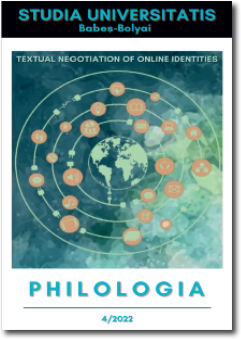IS THE FUTURE HYBRID? AN ANALYSIS OF OPPORTUNITIES FOR DIGITAL EDUCATION
DOI:
https://doi.org/10.24193/subbphilo.2022.4.11Keywords:
hybrid education, pandemic, digital skills, online learning, SWOT analysisAbstract
Is the Future Hybrid? An Analysis of Opportunities for Digital Education. The year 2020 undoubtedly marked a turning point in education. The abrupt passage to online teaching created an overwhelming feeling of uncertainty regarding the aims, efficiency, and outcome of this type of educational endeavor. Nevertheless, the two years with strict anti-epidemic measures and frustrating lockdowns have opened an opportunity to rethink the in-person traditional teaching experience. The current article wants to analyze the main concepts that provide the framework for online teaching and to answer the following research question: Are post pandemic undergraduate students more willing to use online learning? The research method is based on responses to a questionnaire survey sent to students in one subject area: legal studies. A SWOT (Strengths, Weaknesses, Opportunities, and Threats) analysis is then used to provide a framework to better understand the present and future situation of online education. The conclusion suggests that the recent online teaching experience changed students’ perception on digital pedagogy, indicating a new direction to all educators.
Article history: Received 31 July 2022; Revised 15 October 2022; Accepted 4 November 2022; Available online 20 December 2022; Available print 30 December 2022.
REZUMAT. Va fi viitorul hibrid? O analiză de oportunități in educația digitală. Anul 2020 a marcat un punct de cotitură in educație. Trecerea abruptă la învățarea online a creat un sentiment generalizat de incertitudine în ceea ce privește obiectivele, eficiența și finalitatea demersului didactic de acest tip. Cu toate acestea, cei doi ani presărați cu măsuri anti-epidemice stricte și restricții frustrante au deschis perspectiva regândirii pedagogiei clasice. Articolul de față își propune să analizeze principalele concepte care au contribuit la modelarea unui cadru pentru învățarea online și să răspundă următoarei întrebări: Sunt studenții generației post-pandemie mai deschiși spre învățarea online? Metodologia utilizată implică folosirea unui chestionar adresat unui grup de studenți în primul an de studiu la Facultatea de Drept. În urma analizării datelor și validarea întrebării propuse a fost utilizată analiza de tip SWOT.
Cuvinte-cheie: educație hibridă, pandemie, competențe digitale, învățare online, analiză SWOT
References
Capranos, David, Loralee Dyers, and Andrew Magda. 2021. Voice of the online learner 2021: Amplifying student voices in extraordinary times. Louisville: Wiley Education Services. Accessed July 21, 2022. https://edservices.wiley.com/wp-content/uploads/2021/09/202108-VOL-reportWES-digital-FINAL-Revised.pdf
European Commission, Directorate-General for Education, Youth, Sport, and Culture, Humpl, S., T Andersen. 2022. The future of digital and online learning in higher education, Publications Office of the European Union, https://data.europa.eu/doi/10.2766/587756
Gaebel, Michael, Thérèse Zhang, Henriette Stoeber, and Alison Morrisroe. 2021. Digitally enhanced learning and teaching in European HEIs. European University Association. Accessed June 15, 2022. https://eua.eu/downloads/publications/digihe%20new%20version.pdf
Golden, Sarah, Tami McCrone, Matthew Walker, and Peter Rudd. 2006. Impact of e-learning in Further Education: Survey of Scale and Breadth. National Foundation for Educational Research, Research Report RR745.
Harmer, Jeremy. 2001. The Practice of English Language Teaching. Pearson Education Ltd.
Hodges, Charles, Stephanie Moore, Barbara Lockee, Torrey Trust, and M. A. Bond. 2020. The difference between emergency remote teaching and online learning. Educause, March 27. Accessed June 15, 2022. https://er.educause.edu/articles/2020/3/the-difference-between-emergency-remoteteaching-and-online-learning
Mead, George H. 1967. Mind, Self, and Society from the Standpoint of a Social Behaviorist vol. 1. University of Chicago Press.
Monitorul Oficial, Legea educatiei nationale, Legea nr. 1/2011. Accessed July 10, 2022. http://www.dreptonline.ro/legislatie/legea_educatiei_nationale_lege_1_2011.php
Morris, Sean Michael. 2014. What Is Digital Pedagogy? (seanmichaelmorris.com) Accessed July 10, 2022.
Orr, Betsy. 2013. “Conducting a SWOT Analysis for Education Programs.” US-China Education Review A, 3 (6): 381-384.
Ordinul ministrului Educației Naționale nr. 5.670/18.12.2017 privind acreditarea programelor de formare continua. Accessed July 10, 2022.
https://www.edu.ro/etichete/acreditare-programe-formare-continu%C4%83.
Papacharissi, Zizi (ed.). 2011. Networked Self. Identity, Community, and Culture on Social Network Sites. Routledge Taylor and Francis Group.
Rosenthal, Jack. 2009. “A terrible thing to waste.” New York Times. Accessed July 10, 2022. https://www.nytimes.com/2009/08/02/magazine/02FOB-onlanguage-t.html
Stoller, James, K. A. 2020. “Perspective on the Educational “SWOT” of the Coronavirus Pandemic.” Journal of American College of Chest Physicians. Elsevier Inc. DOI: https://doi.org/10.1016/j.chest.2020.09.087
Stommel, Jesse. 2012. “What is Hybrid Pedagogy?” Hybrid pedagogy: a digital journal of learning, teaching, and technology. Hybrid Pedagogy Inc.
Turkle, Sherry. 1997. Life on the screen: identity in the internet age. Touchstone.
UNESCO. 2017. Education for Sustainable Development Goals.
Van Dijk, Jan. 2006. The Network Society. Social Aspects of New Media. SAGE Publications Ltd.
Downloads
Published
How to Cite
Issue
Section
License
Copyright (c) 2022 Studia Universitatis Babeș-Bolyai Philologia

This work is licensed under a Creative Commons Attribution-NonCommercial-NoDerivatives 4.0 International License.





 ©Studia Universitatis Babeş-Bolyai Philologia. Published by Babeș-Bolyai University.
©Studia Universitatis Babeş-Bolyai Philologia. Published by Babeș-Bolyai University.